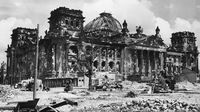The two major Christian churches in Germany have characterized May 8, 1945, as a "day of liberation and a new beginning." Although Europe was in ruins and millions of people had lost their lives through the war and the Nazi state's machinery of destruction, the end of the war on Thursday, May 8, 1945, marked the beginning of a time of reconciliation, peace, European integration, and transatlantic friendship, according to the chairman of the German Bishops' Conference, Bishop Georg Bätzing, and the chairwoman of the Council of the Evangelical Church, Bishop Kirsten Fehrs, on Wednesday, May 7, 2025, in Bonn and Hanover.
With the joint commitment of states to non-violence and human rights in 1990, a new era was founded. The churches commemorate the European reconstruction work of global peacekeeping, stating: "From gratitude for reconciliation grows the will: This time we defend our values. To all attempts to revive the spirits of violence and misanthropy, we counter: Not with us, never again."
The state of Berlin commemorates the anniversary of the end of the war in 2025 with a one-off public holiday. In a theme week taking place from May 2 to May 11, more than 100 events are planned throughout the city. The focus of the theme week is the open-air exhibition "… finally peace?!" on Pariser Platz, which will delve into the historical significance of May 8, 1945, and its implications for the future.
As part of the theme week, the premiere of the oratorio "Liberation" by composer Marc Sinan will take place on May 2, 2025, on Pariser Platz. The open-air exhibition will feature twelve chapters that explore the liberation of Europe from National Socialism and the consequences of Germany's military defeat. Visitors can engage with large-format photographs, informative texts, and biographical portraits, encouraging exploration, remembrance, and discussion.
When the Wehrmacht surrendered unconditionally in Berlin-Karlshorst on May 8, 1945, the Second World War in Europe was officially over. This surrender followed weeks of intense fighting in Berlin, culminating in the city's capture by the Red Army and Polish forces on May 2, 1945. The scale of this final battle was devastating, with over 70,000 Soviet, nearly 9,000 Polish, and at least 90,000 German soldiers killed, along with tens of thousands of civilian casualties.
On the evening of May 8, 2025, the first sentence of the first article of the Basic Law will be projected onto the Brandenburg Gate: "Human dignity is inviolable." This projection will serve as a poignant reminder of the values that emerged from the ashes of the war.
Throughout Berlin, more than 60 registered memorial events are planned, including discussions, exhibitions, and guided tours. One of the significant events is a historical bike tour that follows the route taken by the Allied delegations and the German Wehrmacht on the day of the surrender. This approximately 15-kilometer tour will start at the former Tempelhof airport, where the surrender was signed, and end at the Berlin-Karlshorst Museum.
Additionally, the Fichtebunker will open its doors to visitors on May 8, allowing them to explore its historical significance as a shelter during and after the war. The bunker has a rich history, having served various purposes since its construction in the 1880s.
Another exhibition, titled "1945 – Resistance against National Socialism at the End of the War," will showcase the acts of defiance against the Nazi regime during its final days. This exhibition runs from April 10 to August 25, 2025, at the Gedenkstätte Deutscher Widerstand, highlighting the bravery of those who resisted the oppressive regime.
The theme week will also feature discussions about the legacy of Soviet monuments in Germany, including the Panzerdenkmal located at the Berlin-Karlshorst Museum. These monuments, which commemorate the victory over fascism, are the subject of ongoing debates regarding their place in contemporary memory culture.
The exhibition "The War and Me – War Children 1939-1945" will also open in the Mitte Museum, running from May 8 to October 30, 2025. This exhibition focuses on the experiences of children during the war, providing emotional insights into the impact of conflict on young lives.
In contrast to the celebrations in Berlin, the memory of May 8 is complex across Europe. For many, it represents liberation from the oppressive Nazi regime, while for others, it signifies the beginning of a new struggle under Soviet influence. Countries such as Bulgaria, Poland, Romania, and Moldova officially celebrate the end of the war on May 8, distancing themselves from the Soviet narrative that predominates in Russia, which commemorates the event on May 9.
In the Bundestag, speeches will be delivered by notable figures, including the new President of the Bundestag Julia Klöckner and Federal President Frank-Walter Steinmeier, who will also participate in wreath-laying ceremonies. The decision to exclude representatives from Russia and Belarus from the central commemoration ceremony reflects the ongoing geopolitical tensions and the differing narratives surrounding the war's legacy.
As the day approaches, various cultural events, including concerts and film screenings, will take place in Berlin, emphasizing the importance of remembrance and reflection. The theme week aims not only to honor the past but also to foster dialogue about the values of freedom, dignity, and human rights that emerged from the war.
Ultimately, the observance of May 8, 2025, in Berlin serves as a reminder of the resilience of the human spirit and the ongoing commitment to uphold the principles of peace and reconciliation in a world still grappling with the shadows of history.





